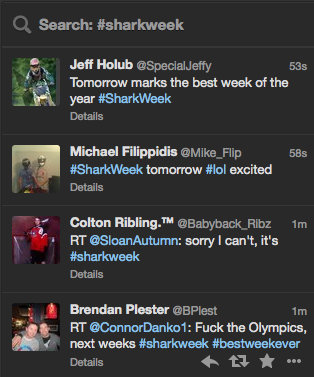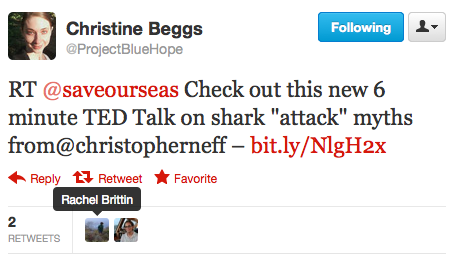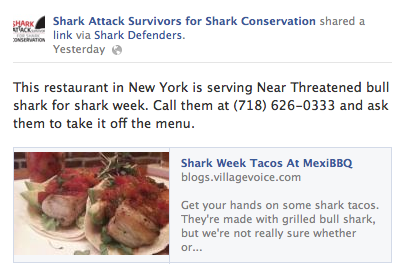#SharkWeek Social Media: How to Hack It
// These tips are part of our #Sharkweek toolkit for ocean communicators.
As Aaron astutely pointed out earlier this week, the online #sharkweek conversation is BIG, and getting BIGGER. The majority of people involved in the conversation are merely saying "YAY sharks!!" and conservation-themed content only represents a small slice of the pie:

We are excited to jump into the shark week conversation and widen the green slice of the pie. We want to reach the masses of people who are stoked about shark week but don't know about the threats sharks face.
We've got a few ideas of how to do just that. Here are our tips for using Twitter and Facebook effectively to reach new audiences and increase attention to shark conservation during Shark Week.
These tips are for ocean-y social media managers and shark evangelists for how to engage their communities. Want tips you can share with your followers for how they can use social media to be better shark savers during #sharkweek? Share this image with them!
On Twitter
1. Monitor the conversation.
Set up a search for #sharkweek and "shark week" using your favorite Twitter tool (I use Tweetdeck, but Hootsuite is another great option). This is most of the battle. Our data indicates that this will be a bit of a firehose - we are expecting at least 200,000 mentions of Shark Week this year. Pay attention to what people are saying - look for misinformation, but also look for the people who are big shark fans and are really engaged. Everyone is a potential supporter for your cause.
Chances are, people are talking about your issue, and they might not know you exist. If you're running a campaign on hammerhead sharks, set up a search for "hammerhead," and if you're running a campaign about shark attack survivors, set up a search for "shark attack."

2. Respond to celebration with celebration.
It can be tempting to respond to a tweet that says "yeah Shark Week!" with a tweet that says "Glad you're tuning in, check out our information about shark finning." If you're reading this, chances are good that you'll be sharing lots of conservation-oriented content throughout the week. When you see people sharing their excitement about sharks, the best way to engage is to agree or ask a question. If they like your response, they'll take a look at what else you have to say. Join in the celebration, and engage people who love sharks with your own enthusiasm for them. If someone posts an awesome video, tell them you love the video - that's it!
3. Be online when Shark Week is on air.
Yes, I know you have a life outside of Shark Week, and devoting hours from your evening to outreach isn't necessarily at the top of your list. But most of the conversation about Shark Week is likely to happen when the specials air on Discovery - at 9 pm local time. If you're on the West Coast, you get a double whammy of opportunity. Hop online at 6 and at 9, and listen to what people are saying.
4. Echo your colleagues and amplify other campaigns.
Because this is a huge spike in attention, it will be harder for your message to cut through the noise. The BIGness of the online shark conversation during Shark Week represents an opportunity, but it also means you might have to work a bit harder to make your message heard. Social media works best when you are generous and conversational. We recommend that you listen to what your conservation colleagues are doing and amplify their campaigns. They'll most likely amplify yours in return. Win win.

5. Reward your superfollowers.
The most social media-savvy nonprofits have built large, engaged followings by responding to and retweeting their best fans. If someone tweets you with a tip, an idea, feedback, or an image, reciprocate by thanking them, retweeting their content, and more. One great way to do this is to ask a question of your followers, like "what's your favorite kind of shark?" or "what's your favorite show on Shark Week so far?" and letting your followers know that you'll retweet the best responses. When new people stumble upon your profile, they'll be that more likely to click "follow" because they know there's something in it for them, and that they'll be joining a real community.
On Facebook
1. Share and cross pollinate!
I'm going to echo my Twitter tip #4 from above again: be altruistic, and your message will go farther! If a conservation organization posts a great video or article, the best thing to do is to share their post on your wall, rather than repackaging that content into a new "original" post. Why? The Facebook algorithm works such that if an image is shared on multiple walls, all the "likes" and "shares" are counted in aggregate. If something has higher likes and shares, it's more likely to show up on your fans' news feeds. So if something already has 20 shares and 100 likes, keep adding to that by sharing it to your own wall, rather than resetting the ticker to zero. It works!

2. Ask your fans to like and share.
There's nothing wrong with asking for a favor now and then, especially if it's a low-barrier ask. When you post something, ask yourself, "would I share this?" If the answer is no, then don't post it on your wall. If the answer is yes, then don't be afraid to ask your fans to do the same.
3. Nothing beats a visual. Well, except a visual with some text.
If you've been on social media for longer than a week, you probably already know that images get higher engagement on Facebook than text. But sometimes, that awesome picture of a shark doesn't fully send the message you're trying to get across. Open up Photoshop, quickmeme or Aviary and put an inspirational quote, a startling fact, or a call to action on that picture. That way you can ensure that your message doesn't get lost when your fans decide to share the image on their own wall.
4. Respond to feedback.
When you post the best and most shareable content, people will comment. If you appreciate their engagement, hit "like." If they've got a question for you, respond (quickly!). If people post comments that spread misinformation about sharks, it's a great opportunity for you to myth-bust (check out our shark mythbusting tool here!).

Add a comment